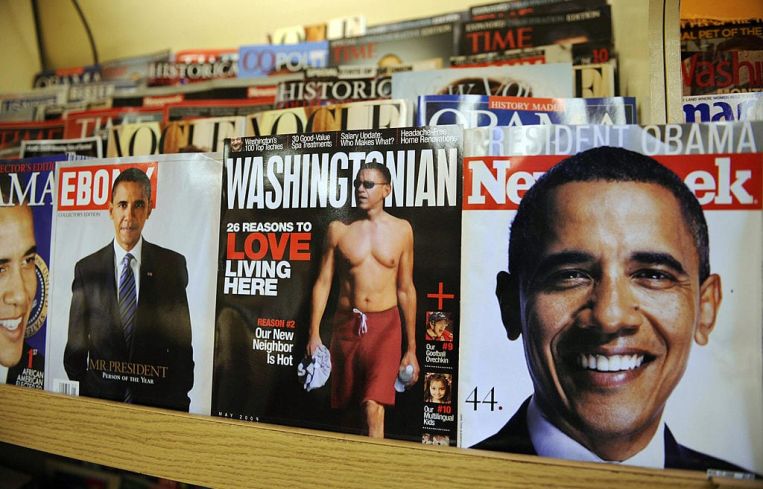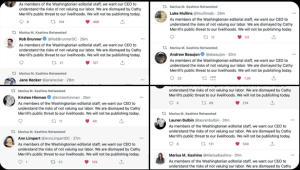Washingtonian Back to Work After Protest Over CEO’s Op-Ed
The staff has formed a committee to make reopening recommendations to management
By Celia Young May 14, 2021 5:50 pm
reprints
The Washingtonian — a monthly D.C. magazine and website — is back to publishing online and has created an office reopening committee after going dark last Friday in protest of an opinion piece authored by its CEO, Cathy Merrill.
The staff mutinied after Merrill penned an op-ed in The Washington Post last Thursday that many saw as threatening staffers if they did not return to the office.
Merrill walked her statements back in an internal memo and apology to her staff on Monday, Andrew Beaujon, a senior editor at the Washingtonian, told Commercial Observer.
“She promised to listen to us,” Beaujon said. “One of our big concerns was that this plan [for a] reopening was going to be directed top-down … [But] now, Washingtonian has an office reopening committee.”
Merrill did not immediately respond to a request for comment.
The committee — which includes six people from the editorial, sales, custom print, administrative and digital sides of the publication — is charged with creating a reopening plan as businesses nationwide wonder if, when and how to bring employees back to the office. Questions over the availability of vaccinations to staff member’s children, health concerns and productivity are all on the minds of this six-person team, said Beaujon, who is part of the committee.
“We just had our first meeting yesterday,” he told CO. “We’re trying to figure out how we balance the shifting safety picture. When we met yesterday, we were talking about masks and then 20 minutes later the [Center for Disease Control] said that you don’t need masks anymore,” he said, referring to the CDC’s Thursday announcement that vaccinated people are not required to wear masks indoors.
The committee will survey the 50 or so staff members on the paper and make recommendations to management by early June on how to reopen the office, and Beaujon said many employees have preferred a hybrid in-person and work-from-home option.
Beaujon says that committee wouldn’t have happened without the online fervor over Merrill’s op-ed. Beaujon’s own tweet announcing the stoppage was retweeted 4,000 times and garnered almost 30,000 likes. Others tweeting the same words about the protest collected thousands of likes and retweets total.

“It was really stunning. We did not expect it. We thought, maybe one person would write about it,” Beaujon said. “Being in the group of people that everybody wants to talk to, was…well, in reporting, you’re never used to people wanting to talk to you. So that was pretty weird.”
All eyes were drawn to the Washingtonian after Merrill’s piece was published, originally with the headline: “As a CEO, I want my employees to understand the risk of not returning to work in the office.” (The title was later changed.) In it, Merrill made some of the conventional arguments for the office — like its role in fostering culture, attracting talent and developing employees — but then argued employers had a “tempting economic option” to demote employees to “contractor” status if they chose to miss out on “extra” in-person office interactions.
A demotion to contractor would result in an employee’s loss of health care, 401K matching and other benefits, she wrote.
In response, the Washingtonian team refused to publish online last Friday, though they continued to work on other projects and the print edition of the magazine. They resumed publishing on Monday.
Beaujon and other staff members were shocked by the piece, he said, but even more shocked by the outpouring of support online and how successful the work stoppage was in getting their point across.
“I think we have to say it was wildly successful, much more than any of us ever imagined,” he continued.
The story was covered by The New York Times, The Washington Post, CNN and other local and national media outlets. When asked if the success of the protest made Washingtonian staff interested in forming a union, Beaujon said many friends told him he basically already had one.
“We’re very interested in seeing how our management reacts to what the committee is going to recommend,” said Beaujon. “Right now, I don’t think that we’re ready to talk about anything like that but I’ve got to say, acting together really worked. I don’t think that anybody missed that lesson.”

![Spanish-language social distancing safety sticker on a concrete footpath stating 'Espere aquí' [Wait here]](https://commercialobserver.com/wp-content/uploads/sites/3/2026/02/footprints-RF-GettyImages-1291244648-WEB.jpg?quality=80&w=355&h=285&crop=1)

